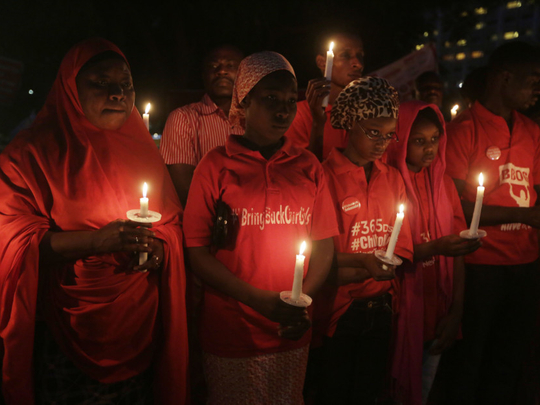
The story that emerged from Nigeria this time last year should have read something like this. “Last night, armed men attempted to kidnap more than 200 girls from Chibok government secondary school in Nigeria’s north-east Borno state. Security forces, stationed at the school to protect the girls, foiled their plan. The president, who flew to Chibok this morning to meet the girls and their families, apologised, admitting more precautions should have been taken. In the wake of several such attempts to kidnap women and girls over the past two years by Jama’at Ahlus-Sunnah Lida’awati wal-Jihad , commonly known as Boko Haram, he announced his government would undertake a comprehensive review to make sure this never happened again. The girls and their families will now benefit from comprehensive medical care and counselling offered by the government.”
If the story had played out like that, it would never have caught the attention of global politicians, celebrities and the Twitterati. But, of course, the girls were in fact abducted by Boko Haram , and one year later, the majority are still missing.
In all the discussions and news coverage that followed the abductions, the voices of women in the region were rarely heard. But they were the first to speak out, continuing the protests and activism in which they have been engaged since the start of the insurgency.
Chibok was the not the first abduction, and it hasn’t been the last. It is estimated that at least 2,000 women and girls have been kidnapped since the start of 2014. Boys and young men have also been taken. Even before the abductions from Chibok, women activists in north-east Nigeria had been trying to raise awareness of what was happening, urge political action and provide services and assistance to those who escaped or were rescued.
This time, the world paid attention. In cities across Nigeria, including Abuja, Lagos, Kano, Port Harcourt and Jos, people went out on the streets, demanding that the government “Bring Back Our Girls”. There were marches and protests across the world.
Stigma and shame
Women also support those who have experienced the brunt of the violence. They provide services to survivors of rape and sexual violence and speak out against the stigma and shame they experience. The University of Maiduguri Muslim women’s association is one of many women-led organisations which have provided food and shelter to those who have fled rural areas for the state capital. The Centre for Women and Adolescent Empowerment, and Tapestry, have set up a support network to address trauma in girls and women, training lay counsellors in communities across the north-eastern states affected by the insurgency.
Working together across ethnic and religious lines, women have repeatedly marched and protested in the streets of Maiduguri, against the continued detention of their family members, for human rights, and for peace and justice.
Yesterday marked one year since the girls were taken from the Chibok government secondary school. Although not at the same fever pitch as in May and June last year, and perhaps all but forgotten outside the country, the abductions are still present in people’s minds in Nigeria. The indefatigable Bring Back Our Girls movement continues to hold protests. Rallying people all around the world, they have called for a week of action in solidarity.
Perceived government inaction in the wake of Chibok abductions was not the only reason Nigerians voted Goodluck Jonathan out of office last month, but insecurity and violence in the north-east was one of the main factors in prompting many to vote for change. The Bring Back Our Girls movement was instrumental in mobilising the country in protests and conversations about the abductions, and in so doing, helped remove a Nigerian president from power in what will be the first democratic transition in the country’s history.
The president of Nigeria is set to change on May 29, but women in the north-east will continue to push for justice, peace, human rights — and the return of women and girls who have been abducted in the past two years. Once in office, the president-elect, Muhammadu Buhari, has to deliver.
— Guardian News & Media Ltd
Chitra Nagarajan has worked to promote and protect the human rights of women in China, United Kingdom, US and west Africa.









